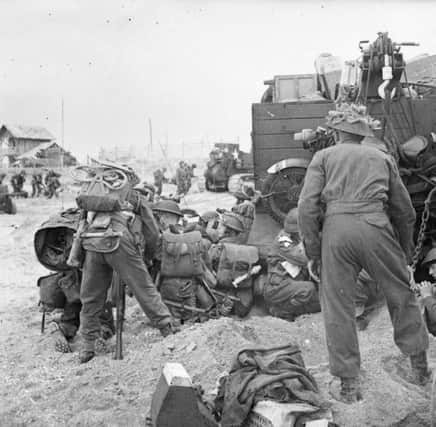War hero remembers his days in the trenches


The pitworker was immediately transported to the days following D-day on June 6, 1944.
Many lasting friendships had been formed among the young men of war during training, bonds that would withstand the passage of time.
Advertisement
Hide AdAdvertisement
Hide AdHugh remembers the day that he disembarked at Sword beach and trudged up to his armpits in cold coastal waters, carrying his kitbag weighing 20lbs with essentials that included the war’s latest hand weapon, the Sten gun, and holding aloft his fold-up bicycle that would get him through the village streets as they ploughed from trench to trench — some they dug out themselves; others abandoned by the German troops before them.
“I remember”, said Hugh as he spokes to an enthralled audience at a special VE night gala dinner at Maccabi Hall in Giffnock on Wednesday, “one day when we were under fire and heavy bombing. One bomb landed in the trench next to mine and the blast was such that it threw me full in the air right out of my trench.” Despite sustaining shrapnel wounds — some of which was so dangerously close to his spinal chord that he was lucky not to have been rendered paralysed — Hugh volunteered to go after a group of enemy soldiers that had kept his men under relentless machinegun fire all morning.
It was an act of utmost bravery. He jumped from the trench, crouching or crawling, mindful of enemy presence all around and made his way stealthfully to behind enemy lines finding the trench where five enemy soldiers manned the machinegun that had his men pinned down.
Two went for their rifles as Hugh surprised them.
The young soldier shot them dead where they stood.
The three in their trench threw out their rifles in surrender, one was a German officer. The men were taken prisoner and sent to Scotland to wait out their war in a prisoner of war camp.
Advertisement
Hide AdAdvertisement
Hide AdTheir war was over. Hugh was sent to military hospital where surgeons worked to free the shrapnel from the bombing, before returning to duty.
As many military did, after the war, he was sent to work down the pits over the sixteen years that followed the end of the war.
As he stood in front of what was to become his new pit boss at a mine in Eskbank, he instantly recognised the man whom he hadn’t seen since the war.
“We meet again, herr kommandant,” said Hugh to the German officer he had taken prisoner years before. Hugh refused to work under him.